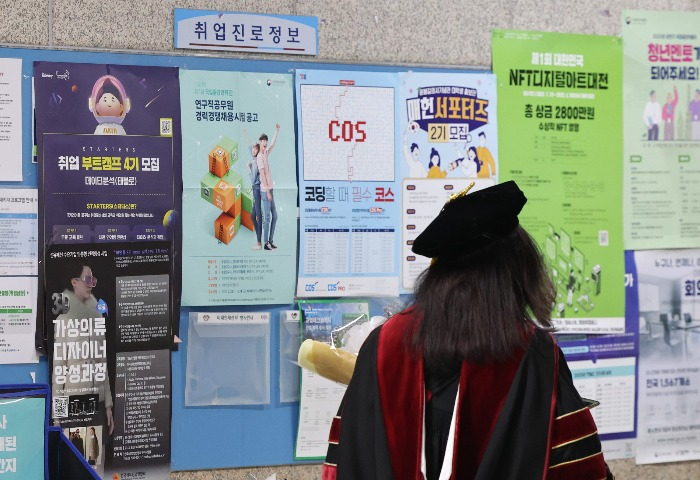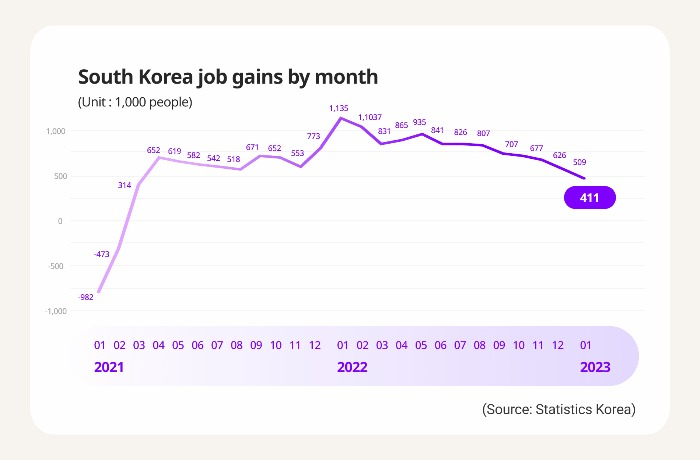Korean jobs up by 22-month low of 411,000 in Jan, with signs of cooling
Korea added mainly non-factory and part-time jobs in January, taken by those in their 60s and older
By Feb 15, 2023 (Gmt+09:00)
LG Chem to sell water filter business to Glenwood PE for $692 million


KT&G eyes overseas M&A after rejecting activist fund's offer


Mirae Asset to be named Korea Post’s core real estate fund operator


StockX in merger talks with Naver’s online reseller Kream


Meritz backs half of ex-manager’s $210 mn hedge fund



South Korea added the smallest number of payrolls in nearly two years in January, with mainly part-time jobs taken by people in their 60s and older, while the country’s backbone manufacturing industry lost jobs for the first time in 15 months, adding to woes for Asia’s fourth-largest economy grappling with falling exports.
According to data released by Statistics Korea on Wednesday, the number of employed people in January grew by 411,000 on-year to 27.36 million. It marked the smallest job gain since March 2021 with 314,000 additions.
The country’s monthly payrolls increased on-year for 23 consecutive months last month, but the growth has slowed after peaking at 935,000 in May last year, signaling a recession.
Worse yet, 97.3%, or 400,000, of the new jobs in January were taken by people aged 60 and older, whereas the number of job additions for people in their 20s and 40s dropped by 43,000 and 63,000, respectively.
The employment rate for those aged 15 and above came to 60.3% in January, up 0.7 percentage points from the same period a year earlier. The unemployment rate was 3.6%, down 0.5 percentage points from a year ago, but that for those in their 20s inched up 0.1 percentage points to 5.8%.
FIRST FACTORY JOB DROP IN 15 MONTHS
Job additions last month were led by the accommodation and restaurant sector, as well as the healthcare and social welfare service sector, up 10.2% and 9.3% from a year ago, respectively.
Korea’s mainstay manufacturing industry, however, lost 35,000 jobs, marking the first fall in 15 months in the aftermath of the country’s sluggish exports.
Exports tumbled 16.6% on-year to $46.3 billion in January, marking the largest decline since May 2020, according to data from the Ministry of Trade, Industry and Energy earlier this month. The country’s overseas sales fell by a revised 9.6% in December 2022, 14.1% in November and 5.8% in October. The drop was mainly driven by a plunge in shipments of its key export item semiconductor.

GRIM JOB MARKET OUTLOOK
The outlook on the country’s job market looks grim without any signs of recovery in exports. The country is expected to see a further slowdown in job additions in February or even an on-year loss in payrolls, given the high base effect in the same month last year.
The Korean government will come up with measures to revitalize the country’s exports and investment, as well as to ease regulations to promote quality job additions by the private sector to prop up the job market, according to the Ministry of Economy and Finance.
In 2022, Korea added 816,000 jobs in total from the previous year thanks to the economic reopening in line with eased Covid-19 restrictions. The finance ministry, however, forecast the country will add about 100,000 jobs in 2023 due to the economic slowdown and the rapidly aging population.
Write to Jin-gyu Kang at josep@hankyung.com
Sookyung Seo edited this article.
-
 EconomyTreasury yield falls signal BOK's looser grip on inflation
EconomyTreasury yield falls signal BOK's looser grip on inflationFeb 13, 2023 (Gmt+09:00)
3 Min read -
 EconomyKorea’s job growth at 11-month low deepens economic woes
EconomyKorea’s job growth at 11-month low deepens economic woesNov 09, 2022 (Gmt+09:00)
1 Min read


